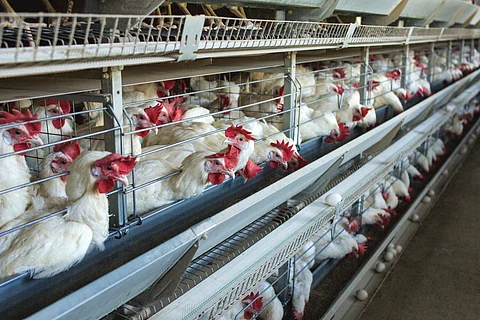

India reported a fatal case of highly pathogenic avian influenza (H5N1), commonly known as bird flu, from Andhra Pradesh. The case marked the country’s first known H5N1 death since 2021.
A two-year-old girl from Narasaraopet town in Palnadu district succumbed to the virus while receiving treatment at the All India Institute of Medical Sciences (AIIMS), Mangalagiri, according to officials.
Authorities suspect that the child may have contracted the infection after consuming raw chicken. However, it remained unclear whether the chicken was consumed accidentally or intentionally fed to her.
T Damodar Naidu, director of animal husbandry for the state, told Down to Earth that the child was initially brought to the hospital on February 28, approximately 2-3 days after reportedly consuming chicken.
“It is unclear whether the child ate raw chicken by accident or was fed it. As the symptoms of fever and cold worsened, the parents took the child to a local hospital,” he said.
She was later referred to AIIMS Mangalagiri on March 4, 2025 as her condition deteriorated.
A statement issued by AIIMS Mangalagiri on April 2, 2025 stated that the girl was admitted to the Paediatric Intensive Care Unit on March 4, 2025 with symptoms of fever and respiratory distress. During hospitalisation, the child was diagnosed with leptospirosis and also tested positive for Influenza A through a nasopharyngeal swab.
“For further determination of the subvariant of influenza, the sample was sent to National Institute of Virology, Pune and it was reported as avian influenza (H5N1). Despite receiving appropriate medical care, the child’s condition deteriorated and unfortunately, she died on March 15,” the statement read.
The hospital added that the case was reported approximately 25 days ago and appeared to be an isolated, sporadic instance of Influenza A, not part of an outbreak. “There appears to be no cause for public alarm at this time,” it said.
The institution also urged the public to remain vigilant and adhere to recommended preventive measures to reduce the risk of influenza.
Naidu stated that the girl’s parents had consumed cooked meat and showed no symptoms of infection. He also noted that no outbreak had been detected in Andhra Pradesh over the past month. “There were isolated outbreaks in February, but effective control measures were implemented promptly,” he said.
Following the child’s death, the department conducted intensive surveillance in poultry farms and backyard flocks across the districts of Guntur, Palnadu and parts of Prakasam. “No traces of the virus were found in the surveyed areas,” he added.
Naidu urged the public to consume only properly cooked chicken and eggs. “Poultry should be cooked to at least 70 degrees Celsius. Eggs should be boiled and not eaten raw,” he advised.
Four human cases of avian influenza — H5N1 and H9N2 — have been reported in India over the past five years, said a statement by the health, medical and family welfare department of the Andhra Pradesh government. These included one case each in Maharashtra (June 2019) and Haryana (July 2021) and two cases in West Bengal (April and May 2024).
India’s last confirmed human death from H5N1 occurred in 2021, when an 11-year-old boy in Haryana succumbed to the disease. The strain has a history of spreading from birds to humans. Eating uncooked or undercooked poultry or drinking unpasteurised (raw) milk can also make humans sick.
According to the World Health Organization (WHO), the H5N1 strain has infected over 500 animal species — including at least 70 mammalian species — and established its presence in 108 countries across five continents.
The virus has a mortality rate of approximately 50 per cent in humans. Since March 2024, at least 70 people in the United States have contracted the virus.
In humans, bird flu symptoms include fever, headache, cough, sore throat, conjunctivitis and difficulty breathing.